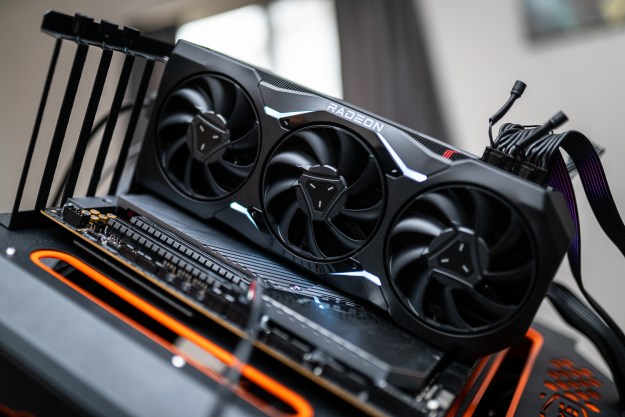Zotac said on Wednesday it is the first manufacturer to cram AMD’s new Radeon RX 400 Series of graphics chips into a miniature PC. More specifically, the company launched the Magnus ERX480 miniature desktop sporting a Radeon RX 480 graphics chip based on AMD’s most recent Polaris graphics architecture. This is the high-end model in the three-card 400 series aiming at the general consumer and is followed by the RX 470 and RX 460 GPUs.
As it does with most mini-PCs, Zotac basically provides two models: one Plus version packed with memory and storage, and one bare-bones version without those ingredients. Zotac provides a third model too that merely adds a Windows 10 Home (64-bit) installation to the Plus model for an added price.
Here are the specifications of the Plus model:
| Processor: | Intel Core i5-6400T (quad-core, 2.2GHz/2.8GHz) |
| Chipset: | Intel 100 Series, AMD |
| System memory: | 8GB DDR4 (up to 32GB) |
| Graphics chip: | Radeon RX 480 |
| Video memory: | 4GB GDDR5 |
| Storage: | 1x 1TB 2.5-inch hard drive 1x 120GB M.2 SATA SSD |
| Wireless connectivity: | Wireless N, Bluetooth 4.2 |
| Wired networking: | 2x gigabit Ethernet ports |
| Ports: | 2x USB 3.0 1x USB 3.1 Type-C 1x USB 3.1 2x USB 2.0 1x SD card reader (3-in-1) 2x HDMI 2.0 2x DisplayPort 1.3 1x Microphone jack 1x Headphone jack |
| Size: | 8.26 x 8.00 x 2.44 inches |
Notice that this mini-PC relies on Wireless N connectivity, which is rather unusual given that most new devices include support for the faster Wireless AC standard. While Wireless N is still just fine for streaming media to Zotac’s new device — the 5GHz band is recommended — PC gamers might want to take advantage of those two gigabit Ethernet ports to eliminate any connectivity issues.
Also, notice that the new mini-PC relies on a sixth-generation Skylake processor rather than Intel’s new seventh-generation Kaby Lake lineup. That is OK, as this device is still plenty good to support VR headsets like the HTC Vive and Oculus Rift. AMD actually set out to provide the masses with a great VR solution when it introduced the RX 480 this summer.
Looking at the bare-bones model, the Magnus ERX480 supports two DDR4 memory chips clocked at 1,866MHz or 2,133MHz, and up to a capacity of 32GB. The drive bay supports 2.5-inch HDDs and SSDs of any capacity via a SATA 3 (6GB/s) connection while the M.2 SSD slot supports 22/42, 22/60, and 22/80 SSD types. There is no slot for an mSATA drive.
The new Zotac mini-PC sits on a flat surface like a set-top box or game console, with most of the ports and the fan exhaust vent residing on the back. The company does not really detail how this unit stays cool outside the fan and heatsink description, but merely states that it is “whisper quiet.” However, in looking at the press photos, there are air intake vents lining the top and bottom edges of the unit’s rectangular chassis, along with an additional air intake vent on the left side.
So far the Zotac Magnus ERX480 has not made an appearance on Newegg or Amazon, so availability and pricing is unknown at the moment.
Editors' Recommendations
- I tested AMD’s RX 7600 XT against the RTX 4060 — and I was shocked by the results
- All ray tracing games on PC: AMD Radeon and Nvidia RTX ray tracing
- Nvidia GeForce RTX 4070 vs. AMD Radeon RX 6950 XT: a close call
- Nvidia RTX 4070 Ti vs. AMD RX 7900 XT: Two odd choices for your next GPU
- AMD RX 7900 XTX: we tested ray tracing in 14 games, with mixed results


